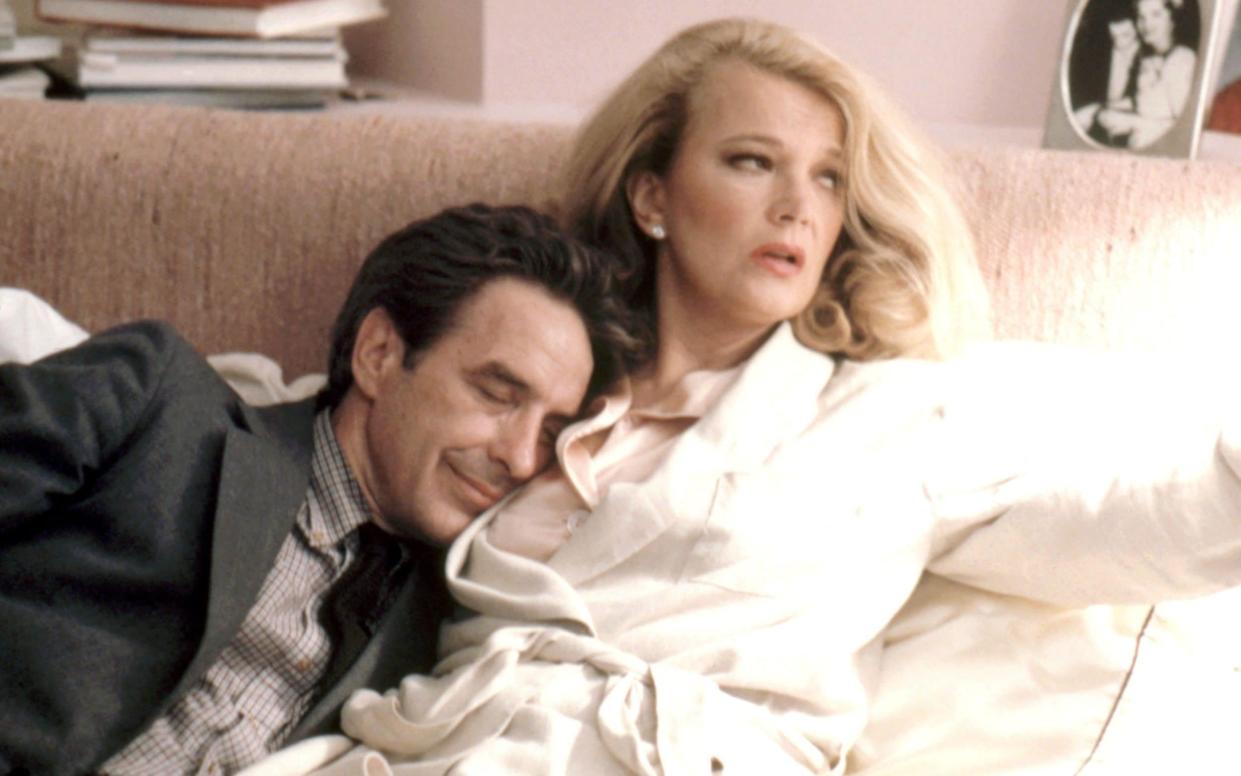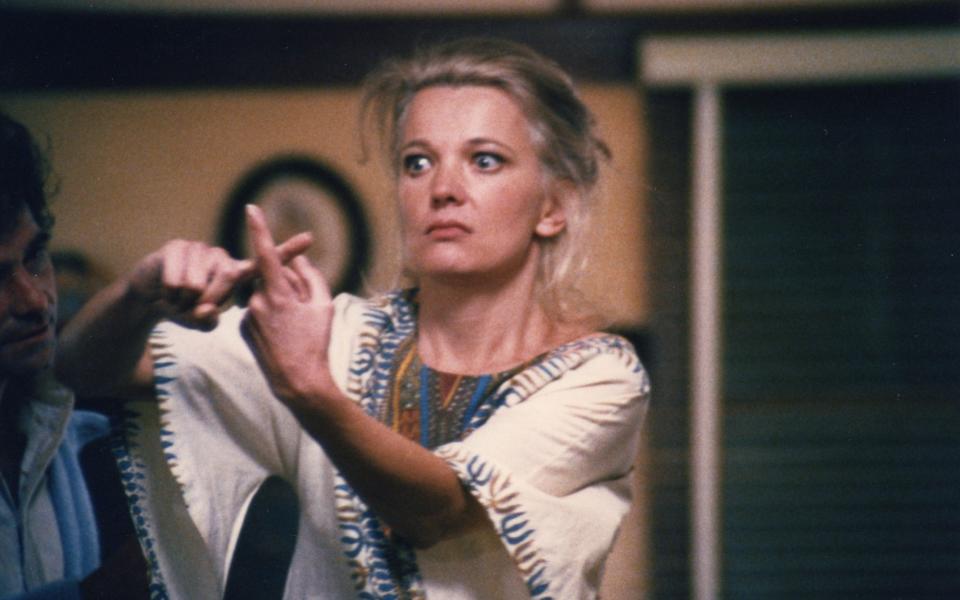Why John Cassavetes, once shunned by Hollywood, is being saved by Sheridan Smith

- Oops!Something went wrong.Please try again later.
- Oops!Something went wrong.Please try again later.
- Oops!Something went wrong.Please try again later.
- Oops!Something went wrong.Please try again later.
- Oops!Something went wrong.Please try again later.
- Oops!Something went wrong.Please try again later.
- Oops!Something went wrong.Please try again later.
Hollywood wasn’t ready in the 1960s and 1970s for writer-director John Cassavetes, now widely seen as the godfather of American independent film, but a hard pill for the industry and public to swallow when he first came along. His shooting style could be raw to the point of frenzy, the acting far from smooth, the psychology intentionally hard to follow, and the plotting often non-existent. He made several deathless masterpieces – Faces, Opening Night, A Woman Under the Influence – that major critics despised.
In most mid-century American drama – whether it was Tennessee Williams, Edward Albee, or the films of Elia Kazan (On the Waterfront) – it was at least possible to puzzle out what the characters wanted, even if life had conspired to thwart their dreams. Conversely, Cassavetes’s men and women seemed to have everything, and didn’t even know what was missing to make them miserable. They got drunk, caroused, laughed inexplicably, and would turn on each other with a bizarre lack of rhyme or reason.
Given the dismissive reception it got at the time, Cassavetes would surely have been astonished that his 1977 film Opening Night, the study of an existential crisis in theatreland, has been adapted into a new West End musical, with a book by Ivo van Hove and music and lyrics by Rufus Wainwright. On its release, no distributor would touch the film, and Cassavetes had to arrange for a self-funded release in Los Angeles and New York, where it played in single sites to virtually empty houses.
Hardly any of the major news outlets even bothered reviewing it. It had Cassavetes’s wife Gena Rowlands, twice Oscar-nominated for his other films, in one of her greatest starring roles as an actress in freefall. This is the character of Myrtle Gordon, whom Sheridan Smith is now bringing to the stage. It was only in 1991, two years after Cassavetes’s death, that an American distributor showed an interest.
Since then, it has become a passionately adored cult favourite, with a story motif – a fatal car accident, while trying to seek an autograph in the rain – which Pedro Almodóvar borrowed for All About My Mother (1999). Dazzlingly, the film rummages within the psyche of an actress with a make-or-break performance to give, fending off her demons but also feeding off them, and reaching for the bottle in ways which alarm her collaborators, and us, too.
The likes of Black Swan, Blue Jasmine and Birdman, all splintered identity studies, owe much to Opening Night. Meanwhile, the new collaboration promises very Cassavetean levels of life imitating art imitating life. Smith, after all, has missed her share of curtain calls, suffering withdrawal and seizures after dropping her anxiety medication, while Wainwright has done career-saving stints in rehab, and wrote the extraordinary song “Go or Go Ahead” in 2003 after narrowly escaping the clutches of crystal meth addiction.
Back in 1958, no one was eager to explore these murky depths, when Cassavetes first touted around his debut feature Shadows, about the deadbeat lives of marginalised jazz musicians, before reworking it with a fuller script the next year. The French New Wave landed at exactly the same time, but it took much longer for such innovations to catch on in Hollywood. Even as late as 1984, when Cassavetes directed his final independent feature, the startling brother-sister story Love Streams, nobody knew what to make of it, least of all the distributor, who lopped 20 minutes out for a mangled VHS release.

In between these dates, Cassavetes was never not busy. He had a side career as an actor-for-hire, in such studio fare as The Dirty Dozen (1967), Rosemary’s Baby (1968) and The Fury (1978), which gave him the money and clout to mount his own films. For his supporting turn in The Dirty Dozen, he was Oscar-nominated for acting; then for writing his own film Faces (1968) and directing A Woman Under the Influence (1974). Even so, his career still epitomises the difficulties of trying to pursue a truly independent vision without compromise.
Faces did make the industry sit up and pay attention to what Cassavetes was doing: two of its actors were nominated, one of these Robert Altman’s secretary, Lynn Carlin, who had never been in front of a camera before. Cassavetes spent years planning and shooting Faces, on a protracted schedule which began with months of rehearsals in 1965. It was about Albee-esque marital warfare in middle-class Los Angeles between the couple played by Carlin and John Marley. They spend huge chunks of the film apart, playing turbulent games with an array of hangers-on, including Rowlands as a blithe sex worker.
It would be Cassavetes’s last film in black-and-white, shot on ultra-grainy, high-contrast 16mm stock to create an illusion of “vérité” which was actually at odds with how carefully planned it all was. Cassavetes always wanted his actors to look as though they were improvising, but they were following a very tight script he would painstakingly sculpt through the filming process. He aimed for the effect of something off-the-cuff to the point of unhinged, but there was never room for ad libbing.
Husbands (1970), which took deeply ordinary lives and doubled down on their tedium and banality, was the most notorious result of this approach. Even supporters of the writer-director’s other work, such as Roger Ebert, baulked at this gaseous study of three middle-aged married friends (played by Peter Falk, Ben Gazzara and Cassavetes himself) who go off the rails after a fourth man’s funeral.

“It shows an important director not merely failing,” Ebert wrote of it, “but not even understanding why.” Pauline Kael called it “infantile and offensive”, and Vincent Canby of the New York Times called it “unbearably long” at 142 minutes – which was 85 minutes shorter than the original director’s cut. It remains agony – the director’s toughest watch, and the one championed most militantly of all by his devotees, who respect how far out on a limb it goes to scour out truths about male behaviour.
It feels wacky to argue that Cassavetes’s most famous film, A Woman Under the Influence (1974), is comparatively accessible. (It’s even longer, and far more emotionally torturous.) Much of this comes down to the character portrait of an extraordinary Rowlands in the title role, as the disturbed Mabel Longhetti, the wife of a brutish construction foreman played by Falk. But the film also has the structural unity of a play, detailing a series of social events at their house in Los Angeles, before and after Mabel is committed for six months to a mental institution.
The film is hard to watch in a different way from Husbands, because of the unending discomfort we feel at Mabel’s spectacular failures to hold it together. Rowlands is the film’s excruciating nerve centre. When Kael said that her “exhausting” performance was “enough for a whole row of Oscars”, she didn’t mean it as a compliment even slightly, but you understand what she’s saying.

Kael’s infamous negative review of the film, which accuses Cassavetes of modishly appropriating RD Laing’s theories of mental illness, is quoted at length by a drawling Jessie Buckley in Charlie Kaufman’s surreal chiller i’m thinking of ending things (2020): “The idiot symbolism may make you want to hoot, but this two-hour-and-thirty-five-minute film leaves you too groggy to do more than moan.” The recital is not a homage to Kael, I don’t think, but more like a poison pen letter to her bullying certitude.
In any case, husband and wife were both Oscar-nominated, and the film was hailed – despite Kael’s dissent – as an operatic new peak for screen realism. Rowlands would get her second nod for the gangster’s moll thriller Gloria (1980), a knocked-off, comparatively facile script which she persuaded Cassavetes to direct for Columbia, enabling him to raise the money for Love Streams.
For all this intermittent acclaim, Cassavetes never picked subjects which made life at all easy for him in the distribution system: he fought losing battles almost every time to get his films released. At the behest of Gazzara, his star for The Killing of a Chinese Bookie (1976), he took out nearly half an hour: it remains gritty but rambling, a fascinating anti-thriller.

To grapple with Cassavetes’s legacy is to be struck by the lack of meaningful separation between his assaultive domestic dramas and handful of genre experiments. Tonally, they blur, collapsing the boundaries of what an audience considers stylised in a movie-ish way, and what’s painfully real. With the lone exception of Gloria, perhaps, we’re never reassuringly ensconced in a “genre” space: losing our bearings in a Cassavetes film is all part of the point.
One could float the argument that no one like Cassavetes would ever manage to function under today’s funding structures. But that would be asking for someone else like Cassavetes to exist in the first place. We can only go back to him, or pay homage – and hope Opening Night brings it off.
Opening Night runs at Gielgud Theatre until July 27 (delfontmacktintosh.co.uk)

